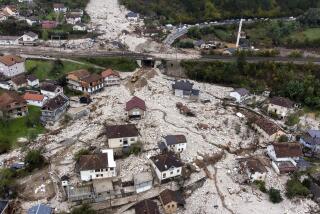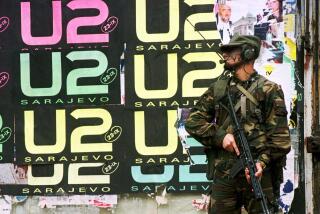Don’t Carve Up Bosnia : Balkans: Fledgling democrats of every nationality, having survived together, deserve to try an integrated government.
The political aim of any international intervention in Bosnia--diplomatic, economic or military--should be clear: reject ethnically defined territories.
Positively, it would mean supporting--at whatever level they are found--forces for democracy, tolerance and peace. Concretely, it would mean spending as much time and political capital locating and nurturing forces for progressive civil politics as has been expended identifying primary individual culprits.
Such a policy would also mean utilizing the U.N. Protection Forces as they were named: to protect--not Muslims, Croats or Serbs, but people, individuals wherever they are, with the guarantee that they could become equal citizens in rebuilt states. Large-scale protection should be offered to endangered populations, and negotiations on Bosnia should adopt as their aim not the country’s effective division but the establishment of an international civil administration or transitional authority, with military backing as required.
Such a strategy would not prejudge a final settlement, but would recognize that there can be no political settlement with only aggressive nationalist leaders at the table and the people under siege. The first step of such a policy would be to open Sarajevo immediately--by diplomacy if possible, by force if necessary--to provide fresh air to the structures of multicultural life still surviving there and to send a message of hope to civil forces throughout the region.
Hard realists, particularly those operating the U.N. / European Community peace conference, reply brusquely that civic and democratic forces in the Balkans control no troops, have few or no seats in parliaments and therefore cannot affect the situation on the ground. They argue that the civic vision sounds nice, but is vague and unworkable, and that anyway, after so much violence, the people of Bosnia no longer want to live together. A liberal coexistence cannot be imposed, they say, and, in short, ethnic division is the only option.
Ask the 80,000 Serbs still in Sarajevo, or those Serbs who recently refused to leave Tuzla despite an arrangement for safe passage out, brokered by the United Nations. Ask the multiethnic group in the Bosnian Serb stronghold of Banja Luka, who have formed a small Civic Forum to keep alive the flame of tolerance and coexistence. Think of the more than 25% of the population from mixed marriages. Consider the thousands of journalists throughout the region who have been fired because of their questionable loyalty to the ideology of ethnic-based states. Visit the peace groups in Serbia, Croatia and Bosnia, or the offices of the independent Belgrade magazine Vreme, the fledgling Hrvatski List in Zagreb and the besieged Oslobodjenje in Sarajevo.
Diplomatic or other pressure on Belgrade and hence on the Serb nationalist forces in Bosnia may or may not cause the Bosnian Serbs to reconsider their position, but it is probably unwise to place bets. In any case, the damage in Bosnia has already been done. And even if a cease-fire could be agreed upon, this would not justify all the past errors nor guarantee a new and just mediating posture.
More important, even a few signatures could not quickly wipe away the vicious nationalist politics that have been seeded throughout the region. It is worth remembering that the Bosnian War broke out after a cease-fire was brokered in Croatia. Similarly, the scenarios for an expanded Balkan war hinge not on the direct spread of the Bosnia fighting, but on the extension of the violent ideologies that that fighting, and the international community’s approach, have fueled. The signatures in Athens last week were met by a sigh of relief in Whitehall and Washington, which was greeted by the first reported use of heavy artillery in local Serb actions in Kosovo, as well as continued attacks on Sarajevo, Zepa and elsewhere.
This is not an ethnic war about ancient animosities, but a deliberately manufactured conflict fueled by vicious populist leaders. Ethnic division is seen as the only option because the world has bought--and largely supported--the warmongering propaganda of Serbian President Slobodan Milosevic and Croatian President Franjo Tudjman. As a result, the international effort has arguably done more harm than good, while calling into question the very legitimacy of the entire system of collective security.
The world is already deeply involved in the Balkan quagmire, and the road out will be difficult and long. But there is a vision for the Balkans, and the sooner it is adopted, the sooner it will be achieved.
More to Read
Sign up for Essential California
The most important California stories and recommendations in your inbox every morning.
You may occasionally receive promotional content from the Los Angeles Times.










